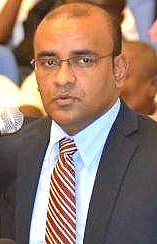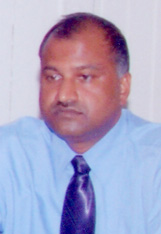The US Department of Justice was prepared in 2009 to respond to a request from Guyana for information on the activities of convicted drug lord Roger Khan but it is unclear if Georgetown ever followed up.
A cable released by whistle-blowing website WikiLeaks revealed that then Charge d’Affairs Karen Williams told Washington that the Justice Department had reviewed investigative files in the Khan case “in order to respond to an official request from the GoG [Government of Guyana] for any information the US had.”

On Tuesday last, President Bharrat Jagdeo said drug traffickers, including Khan, have managed to elude capture because of the lack of evidence, while maintaining that requests to the US for evidence got no response.
“A lot of people know who the drug dealers are but it is catching them in the act,” he told a news conference, while saying that the police commissioner wrote to the US government on more than one occasion in relation to evidence given during the Khan trial but to date there has been no response. “They have this wealth of evidence there and they are interested in us also moving on him [Khan]. We have asked for the sharing of this information and until now we haven’t received that,” he said.
Jagdeo added that he knows a drug dealer who supplies weapons to Guyana called “Tookie” and who was in touch with criminals in Buxton and was also part of the July 2009 Ministry of Health Fire. “Tookie” lives in the US and according to the president that country is yet to “help to get him.”
However, Williams’s comments in the October 28, 2009 cable countered what she described as the GoG’s continued denial that it was involved in Khan’s criminal activities and repeatedly alleging that the lack of information from the US government was a hindrance to Guyana investigating Khan’s activities here.
Local observers have also argued that the GoG was clearly unwilling to probe Khan’s activities here lest it reveal links to government officials.
Reporting to Washington on the sentencing of Khan that month in New York to two concurrent sentences of 15 years, Williams said that public reaction in Guyana was muted and along racial lines.
She also referred to the police announcement of an investigation into the Khan case on October 21, 2009.
“On October 21, the Guyana Police Force (GPF) announced a special investigative team to probe allegations of nearly 200 extra-judicial killings by Khan’s Phantom Squad. Public opinion of the GPF’s capacity to undertake such investigations is generally skeptical and commentators believe people with sensitive knowledge may not trust the GPF and therefore hinder the special investigative team’s effectiveness. Nevertheless, the Guyana Human Rights Association on October 22 submitted a list of nearly 60 people they suspect were murdered by Khan and his Phantom Squad. An alliance of opposition parties including the PNC-R and AFC dismissed the GPF’s special investigative team and reiterated its call for an internationally led inquiry into the Khan-GoG saga.”
Eager
Later that year, in a separate cable, Williams pointed out how nothing was happening in the investigation into Khan.

In a cable dated December 23, 2009, Williams declared that then Crime Chief Seelall Persaud had maintained his position that he needed more information from the US before he could act. In a comment on his position, she said: “In 2007 Persaud publicly stated that Khan was involved in narcotics trafficking, but has changed that line, presumably in exchange for political favor from higher-ups eager to maintain innocence and zero links to Khan.”
She also reported local reaction to the sentencing of former Army Major David Clarke to time served.
“Former Army Major and close associate of drug kingpin Roger Khan, David Clarke’s time-served sentence and release sent shockwaves among local media. Most newspapers allege that both Major Clarke and to an extent, Khan, were given lighter sentences due to valuable information they provided to the U.S. on senior Guyanese officials involved in narcotics trafficking.”
In December 2009, Persaud had said the Guyana Police Force was sifting through the information that had been submitted to the team investigating the criminal activities of Khan. Nearly two years on there has been no further information from the police on this.
He had also repeated that the force was awaiting a response from the US authorities to a request for information on Khan’s alleged killings in Guyana. Williams had two months earlier said that the US was prepared to help.
Rendition
According to the crime chief the information the investigators had received up to December 2009 “did not say that Roger Khan killed anyone.”
Persaud had said in November 2007 that since Khan’s arrest in Suriname and rendition to the USA in 2006, execution-style killings in Guyana had dropped considerably from 43 in 2006 to 12 in 2007. Observers had noted that the implication of Persaud’s pronouncement for Khan’s involvement in the killings was obvious but years later nothing has happened.
Persaud had said at that time, that Khan had a group of men who worked with him while he was here, but since he had been locked up, the men had all gone in different directions. “We believe that Mr Khan was involved in narcotics trafficking and since his arrest we have seen a fragmentation of his gang,” he asserted.
In keeping with its line against investigating Khan, the government in September last year had rejected calls by Canada and the United Kingdom for independent probes into allegations of human rights abuses here, including murders and extra-judicial killings committed by members of the armed forces and a ‘phantom squad.’
“Guyana considers that these recommendations… one sided, misinformed and prejudicial,” the government said in its official response to the United Nations Human Rights Council (UNHRC) on its human rights record.
Appearing before the UNHRC’s Universal Period Review in Geneva, Switzerland, Guyana argued that the movers of the call for an international investigation into human rights abuses and the activities of a ‘phantom squad’ here appear to have ignored the fact that “the worst crime and killing spree in its (Guyana’s) history was waged by violent criminal gangs during the period 2002 -2008, leading to the murder or permanent maiming of hundreds of men, women and children.” It further cited the assassination of a government minister, members of his family and two guards in 2006, execution-style by the Rondell ‘Fineman’ Rawlins gang as well as the massacre of 25 persons, including five children, in Lusignan and Bartica in 2008. “It cannot be over-emphasized that the state and all of its citizens were under siege by these violent criminal gangs using terroristic tactics and politically motivated so as to make the country ungovernable,” the government said.
It added that despite the “horrific period,” Guyana has not been complacent in the face of allegations of abuses of human rights by members of the disciplined forces and it noted the establishment of various Boards of Inquiry, including several courts-martial, which investigated specific cases. The Police Complaints Authority (PCA) and the Guyana Police Force’s Office of Professional Responsibility, it said, also received complaints and investigated them, leading to a number of the perpetrators being brought before the courts. These two permanent bodies continue to function and are responsive, government added.
Bolstering
In bolstering its responses, the administration recalled that Opposition Leader Robert Corbin had brought a motion on October 23, 2009, calling for an international inquiry into Roger Khan, “the so-called leader of the ‘Phantom Squad’” Speaker Ralph Ramkarran had ruled that the motion was inadmissible and advised that it be amended in keeping with the Standing Orders but the opposition took no further action. “The government remains prepared to debate this matter,” it said, while also noting that the Joint Services were congratulated in the National Assembly for bringing an end to the violent crime gangs who terrorized Guyanese society in the period up to 2008 and were urged to foster greater public confidence.
The government also pointed out in Geneva that in October 2009, a special unit headed by Guyana Police Force’s Crime Chief publicly called on all individuals, organisations or groups who may have information or vital evidence concerning the alleged murders involving the Fineman gang, Roger Khan’s gang or any other gang or individuals who may be involved to come forward and provide whatever information or evidence that may be available. “This has borne some fruit and the special unit continues to function,” the government said. There has been no further word from the government on this.





